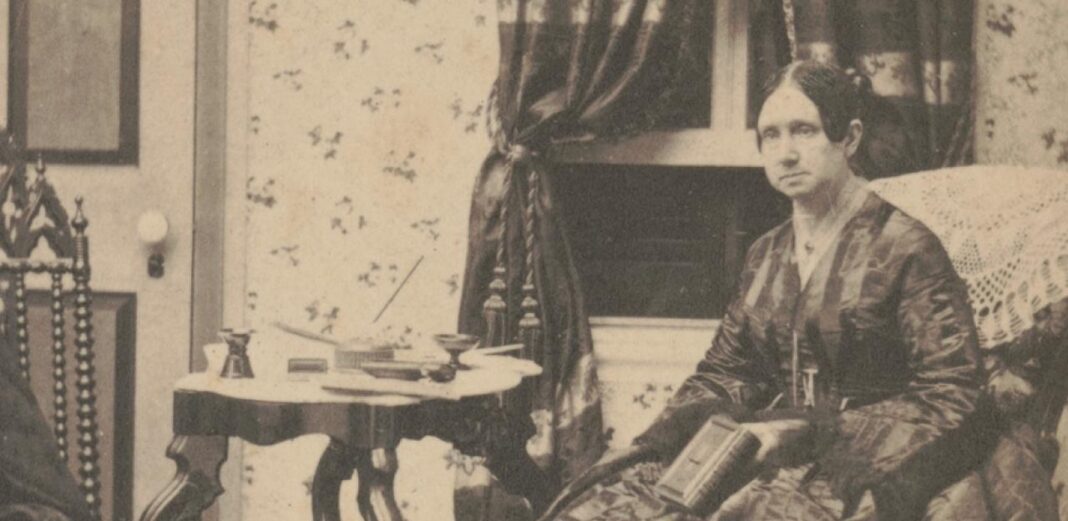Meaningful conversations regarding mental health have become a vital part of the cultural and social zeitgeist. Yet, for generations, individuals afflicted with mental health struggles were often subjugated, mistreated, and unable to access the care they need. Thankfully, through the work of advocates like Dorothea Dix, the conversation shifted, and barriers to care were slowly lifted. Dorothea Dix is a revolutionary thinker, outspoken advocate, and changer of lives here in Trenton and beyond.
Dorothea Dix was born in Hampden, Maine, on April 4th, 1802. Although little details are known regarding her upbringing, records indicate that she was raised in an abusive home with an alcoholic father. To escape this toxic environment, Dorothea relocated, moving in with her grandmother in Boston. While in Boston, Dorothea received an education and began tutoring children in the region. However, due to illness, she was forced to stop teaching and seek medical care. While unwell, Dorothea was encouraged to take the opportunity to spend some time in Europe. While overseas, Dorothea connected with advocates seeking to change how those with mental illnesses receive treatment. It was here that Dorothea’s journey to mental health reform began.
Once Dorothea returned to the United States, she quickly began touring mental health facilities nationwide. She would then present these findings to politicians, encouraging legislation to help better protect and care for those suffering from mental illnesses. Throughout her career, she went on to open mental health facilities in North Carolina, Illinois, and New Jersey. One such facility was Trenton Psychiatric Hospital, New Jersey’s first public mental health hospital.
Before the establishment of Trenton Psychiatric Hospital, individuals with mental illnesses were confined to jails, almshouses, or otherwise confined to their own homes. As a result, individuals were often mistreated, and conditions remained poor for those needing services. Upon opening the hospital, patients would finally gain access to critical care, including medication, hygiene, a healthy diet, and more. In addition to the founding of Trenton Psychiatric Hospital, Dix was also fundamental in the founding of Greystone Psychiatric Hospital. This $2.5 million project was brought about to help lessen overcrowding at the Trenton location.
In addition to her mental health advocacy, Dorothea Dix also involved herself in several other noble causes. During the Civil War, Dorothea was committed to advancing the Union and was the Superintendent of Army Nurses. As a fierce leader with remarkably high standards, Dorothea was a crucial figure in promoting the role of nurses throughout the war. Although male doctors would regularly disparage women in medicine, Dix and other pioneers openly advocated for more significant opportunities for the advancement of women. After the war, Dix raised funds for a memorial honoring the lives of deceased soldiers. Meanwhile, Dorothea continued her fight for improved mental health services and meaningful social reform surrounding the mentally ill.
After a long and fruitful career, Mary retired to Trenton, where she would live out the rest of her days at a designated suite at New Jersey State Hospital (later renamed Trenton Psychiatric Hospital). She remained at this residence until her passing on July 17th, 1887. She is now buried in Cambridge, Massachusetts. Her advocacy and efforts significantly improved the lives and outcomes of mentally ill patients here and abroad. Her efforts set the stage for massive reform, and today, mental health advocacy remains a critical fight. Although Women’s History Month may be coming to a close today and every day, we can continue to be inspired by past, present, and future women who paved the way for a better tomorrow.
SOURCES:
- https://ajp.psychiatryonline.org/doi/full/10.1176/ajp.156.12.1982
- https://www.womenshistory.org/education-resources/biographies/dorothea-dix
- https://njmonthly.com/articles/historic-jersey/11-wow-worthy-women-from-new-jersey/
- https://www.state.nj.us/humanservices/involved/nurses/mentalhph/tph.html







